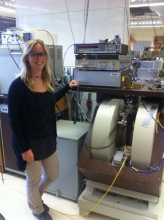
University:
Major:
Mentor(s):
Faculty Sponsor(s):
Faculty Sponsor's Department:
Project Title:
Project Description:
The interactions underlying biological functions must occur in aqueous environments, in which hydration water plays a vital role: it stabilizes biomolecular structures and mediates biophysical processes, such as protein folding and aggregation or molecular recognition. It is known that the repulsive hydration force propagates in the range of 4~10 Å away from a membrane surface. Recent work has revealed small amphiphilic solvents (e.g. DMSO) or ions can alter membrane functions and structures by modulating the hydration force. However, the origin of hydration force at macromolecular interfaces and its relationship to biomembrane functions are still controversial. This study aims to determine the relationship between hydration water and molecular interactions (e.g. hydration force) in dipalmitoylphosphatidylcholine (DPPC) lipid membranes through the measurement of local hydration dynamics by 1H Overhauser Dynamic Nuclear Polarization (DNP)-enhanced NMR spectroscopy. Overhauser DNP enables quantification of translational diffusion dynamics of hydration water within 10 Å of site-specific spin labels on the membrane surface, which is 2-4 fold impeded compared to bulk water diffusivity. The dynamics of lipid headgroupshydration water on the membrane surface and in the intermembrane space at variable DMSO concentrations were studied. Our results suggest that DMSO increases the polarity of phospholipid headgroups and simultaneously slows down the headgroup’s mobility. Our findings clearly exhibit that DMSO perturbs hydration dynamics at the membrane interfaces, likely due to dehydration or alternation of hydrogen bonding networks. These results demonstrate Overhauser DNP is a highly sensitive, selective and site-specific tool to unravel the biomembrane interactions by probing interfacial hydration dynamics.
